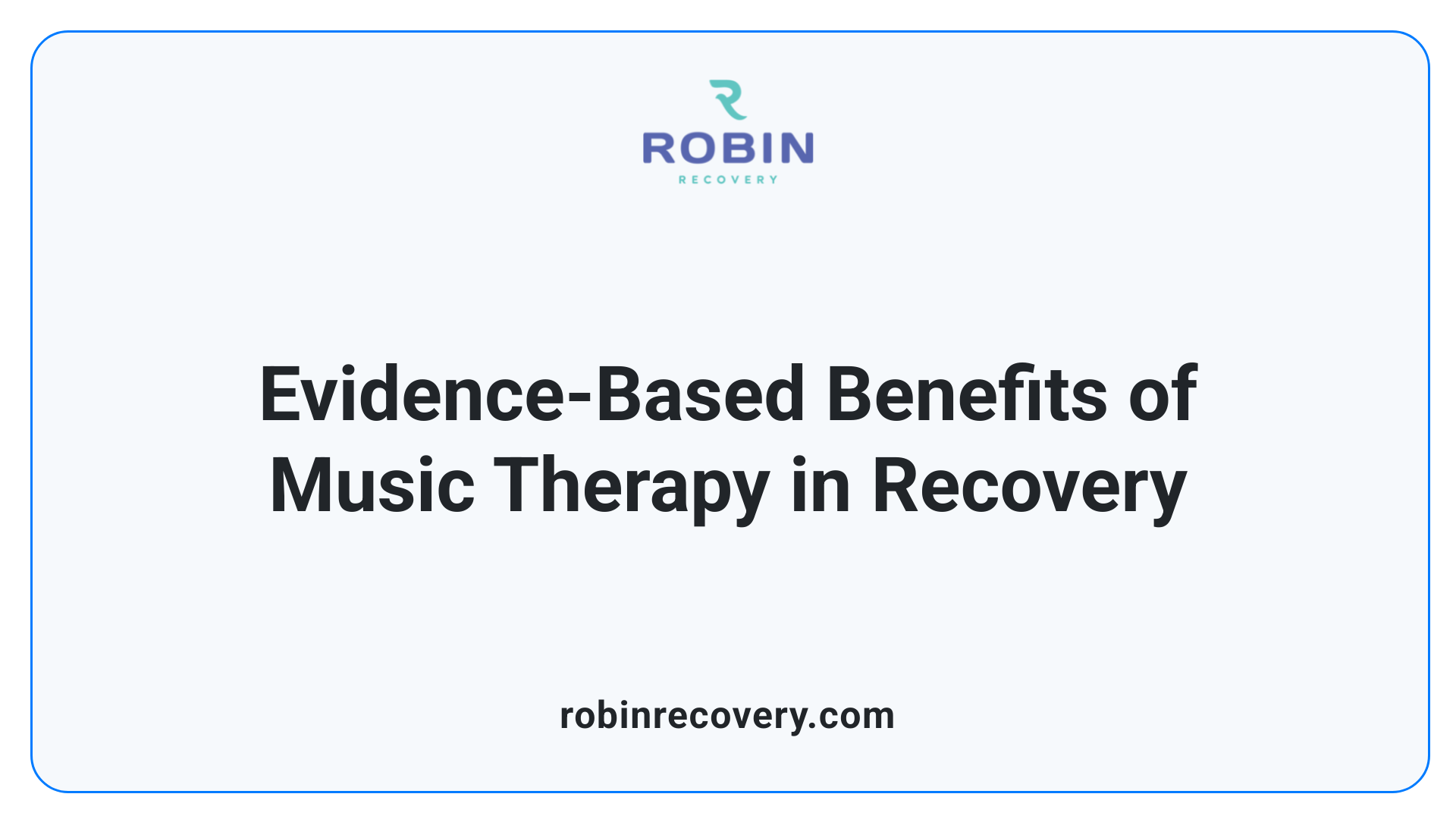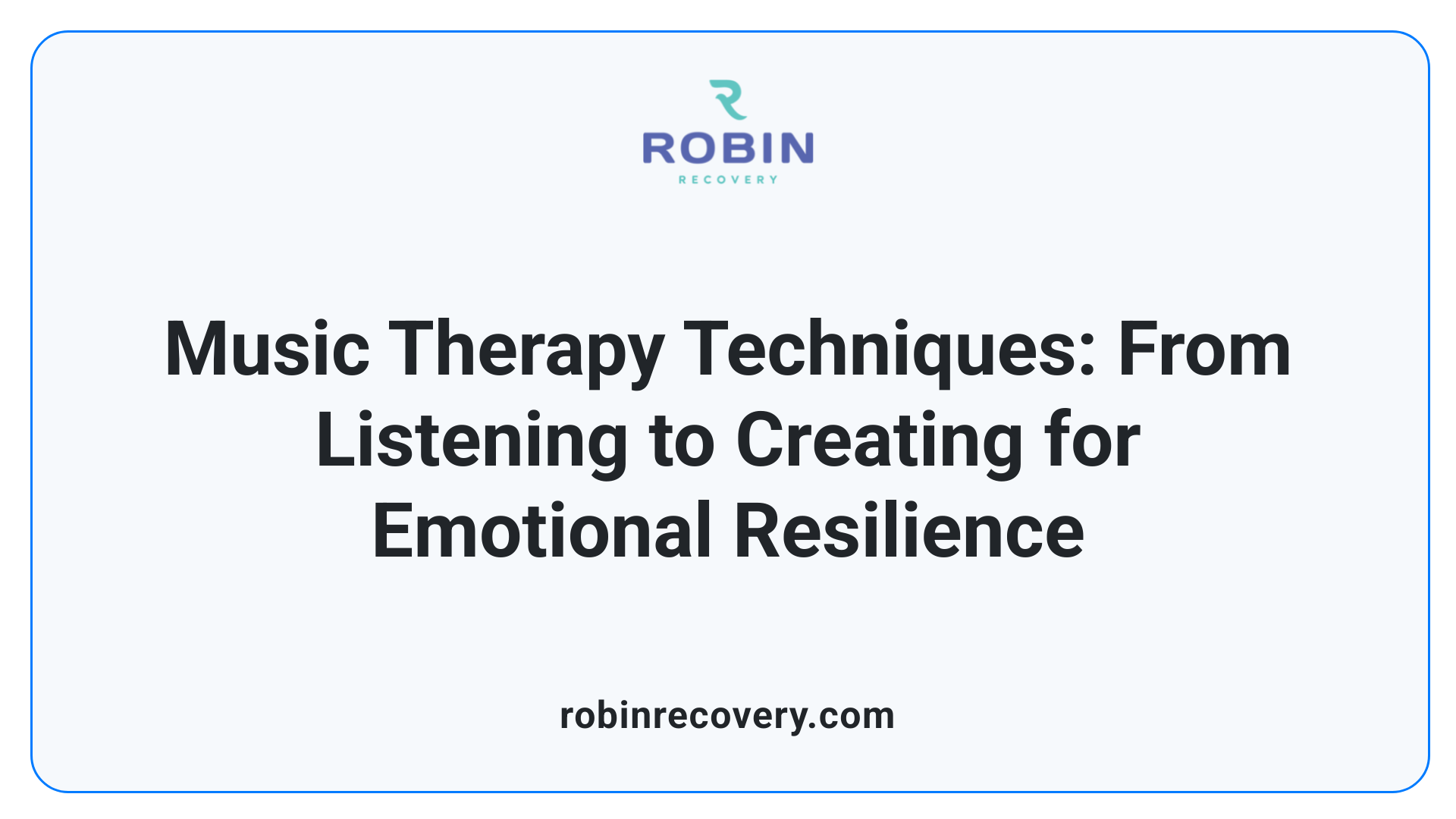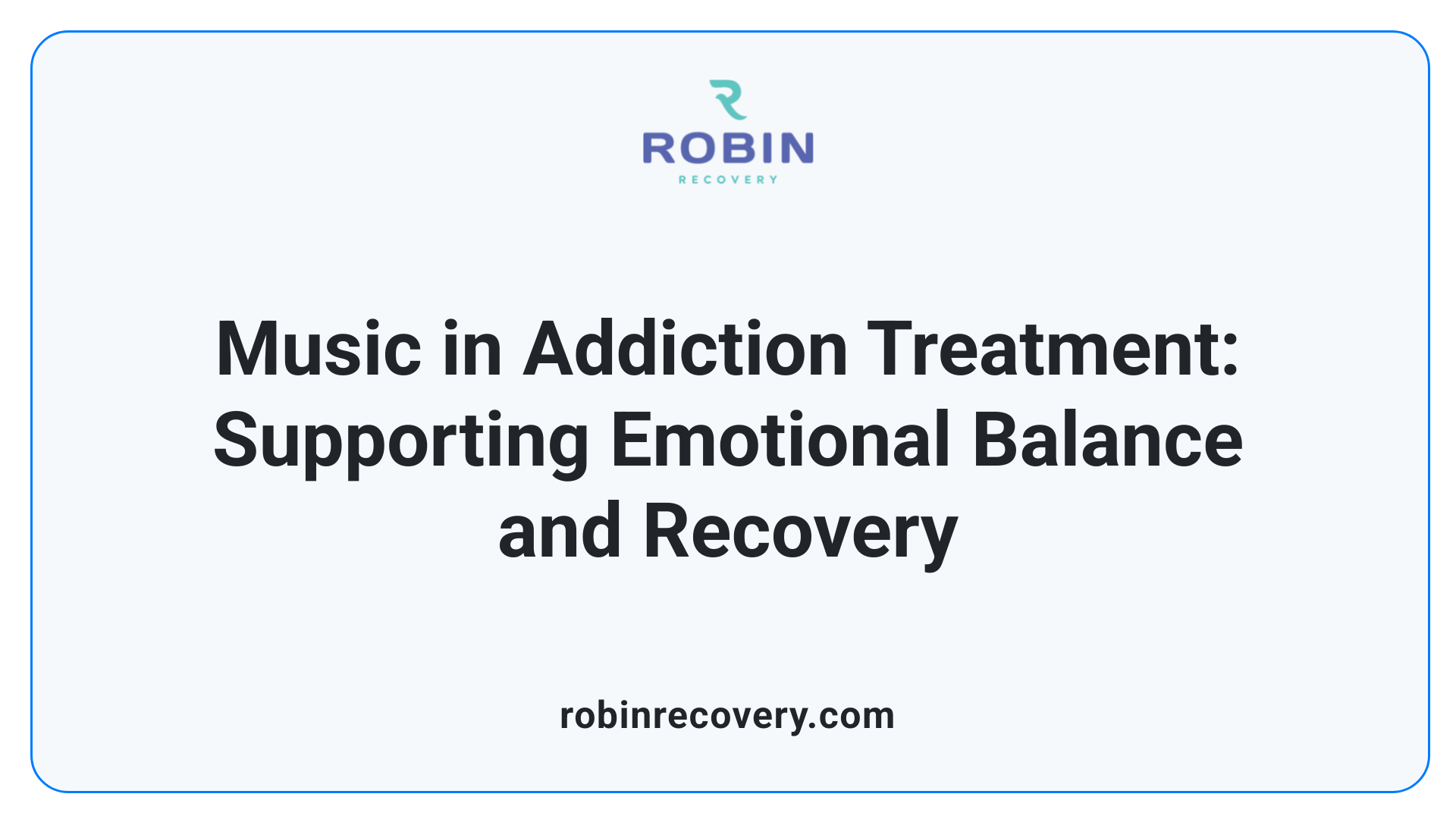The benefits of music therapy for emotional well-being in recovery

Unlocking the Power of Music in Emotional and Mental Recovery
Music therapy has emerged as a transformative approach in supporting emotional well-being during the recovery journey from addiction and mental health challenges. By harnessing the therapeutic qualities of sound, rhythm, and harmony, this evidence-based practice offers a holistic route to emotional regulation, stress reduction, and social connection. This article explores the multifaceted benefits of music therapy, grounding its efficacy in scientific research, brain science, and clinical applications to demonstrate how it contributes to more resilient, balanced, and positive recovery experiences.
Understanding the Therapeutic Foundation of Music Therapy

What scientific research supports the benefits of music therapy for emotional health during recovery?
There is a substantial body of scientific evidence that underpins the effectiveness of music therapy in improving emotional health, especially for those in recovery from addiction or mental health challenges.
Numerous studies and meta-analyses have demonstrated that music therapy can significantly decrease symptoms of anxiety and depression. These benefits are often on par with traditional medications, but with fewer side effects. This is largely due to music’s ability to influence brain regions involved in emotion, reward, and social processing.
Neuroscientific research reveals that engaging with music stimulates the release of neurochemicals such as dopamine and oxytocin. Dopamine, often called the 'feel-good' hormone, engenders feelings of pleasure and motivation, helping to rewire brain circuitry affected by substance use. Oxytocin fosters social bonding and reduces stress.
Physiological evidence shows that music can lower cortisol levels—the hormone linked to stress—and bolster immune function. Listening to calming music or actively participating in musical activities can regulate the autonomic nervous system, promoting relaxation and resilience.
Furthermore, functional brain imaging studies show increased activity in areas associated with emotion regulation, memory, and executive functioning during music therapy sessions. This supports the idea that music actively engages multiple neural networks, aiding emotional processing and cognitive recovery.
Overall, these scientific findings confirm that music therapy is a powerful, evidence-based approach that supports emotional stability, neural health, and overall well-being in recovery situations.
Aspect of Research Findings Details Neurochemical Impact Increases dopamine & oxytocin Enhances mood & social bonds Stress Reduction Lowers cortisol levels Promotes relaxation & immune health Brain Activation Engages emotion & cognition centers Facilitates emotional processing & memory Physiological Benefits Reduces heart rate & blood pressure Supports autonomic nervous system regulation
This scientific foundation underscores why music therapy is integrated into comprehensive treatment plans for emotional and mental health recovery.
Mechanisms and Brain Impact: How Music Facilitates Emotional and Cognitive Recovery

How does music therapy improve brain function and emotional expression during recovery?
Music therapy influences the brain in numerous ways that support emotional and cognitive healing. When individuals engage with music—whether through listening, singing, or playing instruments—it activates multiple areas of the brain responsible for emotion, cognition, and movement. This activation stimulates neural pathways, fostering neuroplasticity—the brain's ability to reorganize itself by forming new connections.
A significant aspect of music therapy's impact is the release of neurochemicals like dopamine and endorphins. Dopamine, often called the pleasure neurotransmitter, is linked to feelings of reward and motivation. Its release during music therapy sessions enhances mood and emotional regulation, which can be especially beneficial during recovery from mental health issues or substance use disorders.
Furthermore, music therapy promotes improved neural connectivity. It supports strengthening communication between brain regions involved in memory, language, problem-solving, and emotional processing. This enhanced connectivity can help recover or compensate for impaired cognitive functions, making it easier to manage daily life and emotional challenges.
Another mechanism by which music influences the brain is through modulation of brainwaves. Slow, relaxing music encourages the production of alpha and theta waves that promote states of calmness and relaxation. Conversely, faster beats can stimulate alertness and focus. By adjusting brainwave activity, music therapy helps regulate mood, reduce anxiety, and improve sleep quality.
Research demonstrates that engaging with music can also lead to structural changes within the brain, such as increased grey matter volume in key areas. These changes improve overall brain plasticity, which is crucial for adapting to new circumstances and recovering from various neurological conditions.
Altogether, music therapy acts on multiple levels of brain function, fostering emotional expression, enhancing neural connections, and promoting a balanced state of alertness and relaxation. This holistic influence makes it an effective tool in the mental, emotional, and physical recovery process.
Techniques and Applications: Harnessing Music to Support Emotional Well-Being

What are some techniques and applications of music therapy used to support emotional well-being?
Music therapy offers a variety of techniques designed to promote emotional health and resilience. These include receptive listening, where individuals focus on relaxing or emotionally evocative music, and active participation methods like singing, songwriting, and playing instruments. Improvisation allows patients to spontaneously create music, fostering self-expression and emotional release.
Other applications incorporate rhythmic activities such as drumming or pulse-based exercises that can improve physical coordination and induce relaxation. Vibro-acoustic therapy, which involves sound vibration to stimulate bodily tissues, can also be used to deepen relaxation and emotional processing.
Personalized music selections play a vital role in therapy, helping to evoke positive memories and emotions that reinforce well-being. Group-based musical activities, such as choir singing or collective drumming sessions, enhance social bonds and build a supportive community.
These techniques are often guided by trained therapists who tailor activities to individual needs and preferences. By engaging both the mind and body, music therapy helps individuals process difficult emotions, reduce stress, and develop effective coping skills. This versatile approach is backed by scientific research and is effective in addressing issues like anxiety, depression, and social isolation, contributing to better emotional health and overall quality of life.
Music as a Medium: Facilitating Emotional Expression and Healing
How does music serve as a medium for emotional expression and healing?
Music plays a powerful role in helping individuals express and process complex emotions. It offers a non-verbal channel for expressing feelings such as sadness, anger, or happiness, which can be difficult to articulate with words alone. This ability to explore feelings through sound and musical activities can lead to significant emotional relief and increased self-awareness.
In music therapy, tailored activities like singing, playing instruments, listening, and analyzing lyrics enable participants to delve into their emotional worlds. These interventions help individuals name and understand their feelings, fostering emotional regulation and resilience.
Music influences brain regions involved in emotion and cognition, promoting relaxation and reducing stress hormones like cortisol. At the same time, engaging with music triggers the release of dopamine, a neurotransmitter associated with pleasure and reward, supporting mental health.
Creating and experiencing music collectively also helps build social bonds. Group activities foster a sense of community, diminish feelings of loneliness, and cultivate emotional resilience. The process of making music and sharing it provides comfort, accountability, and hope, which are critical components of healing.
Overall, music serves as a therapeutic tool to facilitate emotional expression, provide comfort during difficult times, and reinforce a sense of connection and well-being. It supports physical, emotional, and mental healing by opening pathways for self-exploration and emotional growth, making it a versatile and effective medium for recovery and psychological well-being.
Role of Music Therapy in Addiction and Holistic Recovery

What role does music therapy play in addiction treatment and holistic recovery approaches?
Music therapy is an effective complementary modality in addiction recovery, offering support for emotional expression, stress reduction, and cravings management. It engages individuals through both listening and active participation in music-making, such as singing, songwriting, or improvisation.
In treatment settings, music therapy is often combined with evidence-based interventions like Cognitive Behavioral Therapy (CBT) or Dialectical Behavior Therapy (DBT). This integration enhances overall recovery outcomes by promoting self-awareness, emotional regulation, and resilience.
Techniques like lyric analysis and songwriting enable individuals to process complex emotions, confront past traumas, and develop healthier coping mechanisms. These activities foster a sense of identity and purpose, which are vital during recovery.
Moreover, music therapy stimulates the brain’s reward system by triggering the release of dopamine—a neurotransmitter associated with pleasure and motivation. This natural boost helps replenish chemical imbalances caused by substance use, reducing the dependence on external substances.
In addition to psychological benefits, music therapy improves physiological health. It reduces stress hormones like cortisol and lowers heart rate and blood pressure, which can ease withdrawal symptoms and decrease relapse risk.
Group sessions facilitate social bonding and support, providing opportunities for individuals to build positive relationships and community. This social aspect enhances motivation and helps sustain long-term sobriety.
In summary, music therapy supports holistic recovery by addressing emotional, cognitive, and physical aspects of addiction. It complements traditional treatments, fostering a balanced approach for lasting health and well-being.
Scientific Support and Future Perspectives: The Evidence Base for Music Therapy
What scientific research supports the benefits of music therapy for emotional health during recovery?
A strong body of research and comprehensive meta-analyses validate the positive impact of music therapy on emotional well-being during recovery, especially from substance use disorders. Scientific studies consistently show that music therapy can markedly decrease symptoms of anxiety and depression, on par with traditional treatments like medication. These improvements are linked to how music influences the brain's emotional and reward centers, helping to regulate mood and foster feelings of pleasure and safety.
Neuroscientific insights reveal that music actively stimulates areas of the brain involved in emotion, cognition, and social processing. Listening to or participating in music triggers the release of neurochemicals such as dopamine, which enhances mood and motivation. It also promotes the release of oxytocin, encouraging social bonding and trust—crucial elements for recovery within group therapies.
Physiological evidence further supports these effects. When individuals engage with music, their levels of stress hormones like cortisol decrease, and immune function can improve. Such biological responses help reduce overall stress and bolster emotional resilience, which are vital during the demanding process of addiction recovery.
Neuroscientific insights into music’s effects on the brain
Music’s ability to influence brain function is well-documented in neuroscience. It engages multiple neural networks responsible for emotion regulation, memory, sensory perception, and motor planning. Faster-paced music can enhance alertness and focus, while slower, relaxing melodies foster calmness and stress relief.
Research shows that music can enhance cognitive functions such as memory, attention, and executive functioning—areas often impaired during substance abuse and mental health challenges. Neuroimaging studies have demonstrated that music therapy activates pathways in the brain associated with reward, learning, and emotional processing, facilitating neuroplasticity and recovery.
Potential for future research and innovation in music therapy
The future of music therapy lies in personalized and technologically advanced approaches. Emerging research aims to tailor interventions based on an individual’s neural responses and emotional needs, utilizing wearable devices and brain imaging techniques. This will enable therapists to optimize music selections and engagement methods for more precise outcomes.
Additionally, integrating virtual reality and augmented reality with music therapy could revolutionize treatment settings, providing immersive experiences that boost motivation and emotional engagement. Long-term studies are needed to assess the sustained impacts of these innovations and their cost-effectiveness.
Integration with conventional medical and psychological treatments
Music therapy’s strength as a complementary treatment is increasingly recognized within mainstream healthcare. Evidence suggests that when combined with established therapies like cognitive-behavioral therapy (CBT) or dialectical behavior therapy (DBT), music therapy enhances overall treatment outcomes. For example, integrating music into addiction treatment helps manage cravings, process complex emotions, and maintain motivation.
Research indicates that such combined approaches can lead to better adherence to treatment programs, greater emotional expression, and stronger social support networks. Moving forward, interdisciplinary collaboration between music therapists, psychologists, and medical professionals promises to expand the scope and effectiveness of holistic care approaches.
Embracing the Melody of Recovery
As scientific evidence continues to grow and clinical practices evolve, the integration of music therapy into recovery programs offers a powerful tool for fostering emotional resilience, self-awareness, and social connection. Its ability to stimulate brain functions, facilitate emotional expression, and support holistic healing makes it an indispensable component of modern healthcare approaches. Embracing the melody of recovery through music therapy not only enhances individual well-being but also inspires hope and transformation for those on the path to healing.
References
- Music Therapy: Types & Benefits
- Music Therapy For Substance Abuse Treatment
- Understanding the Psychology and Benefits of Music ...
- 10 Benefits of Music Therapy in Recovery
- Exploring the Healing Power of Music: Benefits ...
- Exploring the Benefits of Music Therapy - Phoenix
- Music Therapy Benefits in Addiction Recovery
